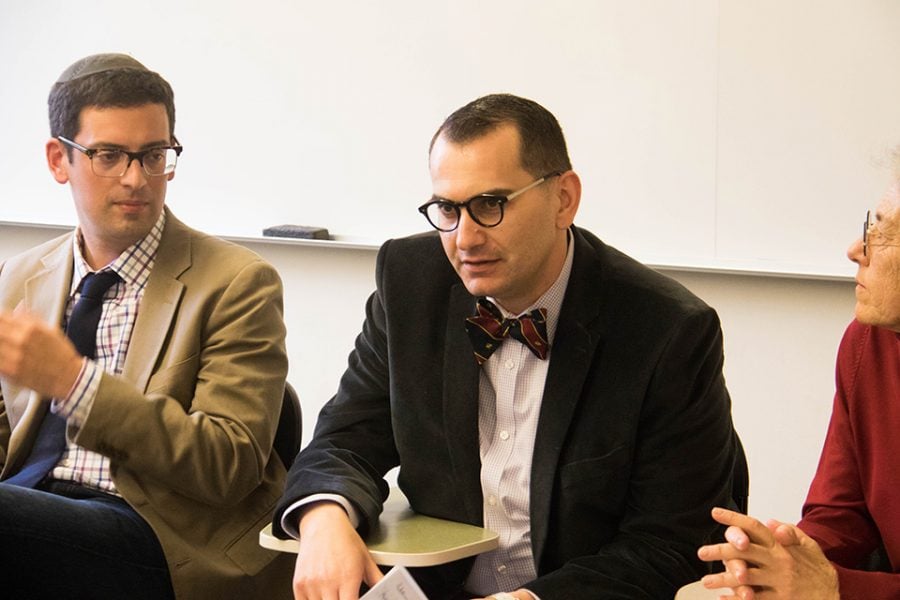Intricacies of Zionism discussed at Israel Week panel
Keshia Johnson/The Daily Northwestern
Middle East and North African Studies lecturer Amjad al-Dajani speaks during a panel about Zionism on Tuesday. Four Northwestern professors sat on the panel, which examined Zionism from various academic and personal perspectives.
May 11, 2016
A panel of four professors examined Zionism from various academic and personal perspectives Tuesday as part of Israel Week, an effort by Northwestern Hillel to celebrate the country and the anniversary of its independence.
“On campus, there’s a notion that Zionism is one thing and one thing only — an exclusive call for Jewish nationality and Jewish nationality only — which is only implementable via oppression and marginalization of Palestinians who are not Jewish,” Weinberg freshman Adam Chanes, who organized the event, told The Daily.
Chanes said some students have forgotten Zionism’s ideological and philosophical heritage, narrowly considering it in an institutional or political sense. He also said some NU students discount the complexity of Zionism and make the term a “dirty word.”
Panelists discussed Zionism’s various interpretations within the Israeli-Palestinian debate, and the ways the term has affected how groups identify one another and themselves.
“From the perspective of Israelis, Zionism is for the return of the Jews to their ancestors’ homeland, while from the Palestinian perspective, it is considered a British conspiracy to reject them from that land,” said Middle East and North African studies lecturer Amjad al-Dajani, who sat on the panel. “You have these two sides and views that are opposite, and in a way, they formulated one another through the conflict.”
Religious Studies Prof. Laurie Zoloth said despite negative connotations that have developed around the idea of Zionism, she’s committed to keeping the term and its original meaning alive.
“I’m not giving up on the term,” she said. “I want to say I’m a Zionist in the same way I want to fly an American flag. I’m not willing to give it away, which is why I think you should keep saying you’re a Zionist and place yourself at the center of that discourse.”
But sometimes, Al-Dajani said Israeli policy can contradict traditional Jewish values.
“I always felt that the Jewish people have a moral compass,” he said. “There is a sense of what is right and what is wrong. I think the disconnect happening is that they are looking at the state or the government in Israel without the consideration of the moral aspect of their actions.”
Michael Simon, executive director of Hillel, told The Daily the week’s events will present various perspectives on the Jewish state to engage more students and allow them to reflect on how they relate to Israel.
He said this effort was a response to intense debates among NU students regarding the Israeli-Palestinian conflict.
“It’s certainly not a quiet topic when it comes to Israel on campus,” Simon said. “It’s still important that we mark Israel Independence Day, but that we do it in a thoughtful way.”
Israel Independence Day begins Wednesday at sundown.
In the larger debate over the conflict, Chanes said Americans don’t discuss Zionism enough, and that challenging conversations like this help reveal misunderstandings about the term.
“People can be 100 percent anti-occupation, anti-oppression and anti-racist and still believe in Jewish cultural peoplehood,” Chanes told The Daily, “because it’s not just one thing.”
Email: [email protected]
Twitter: @_juliadoran


